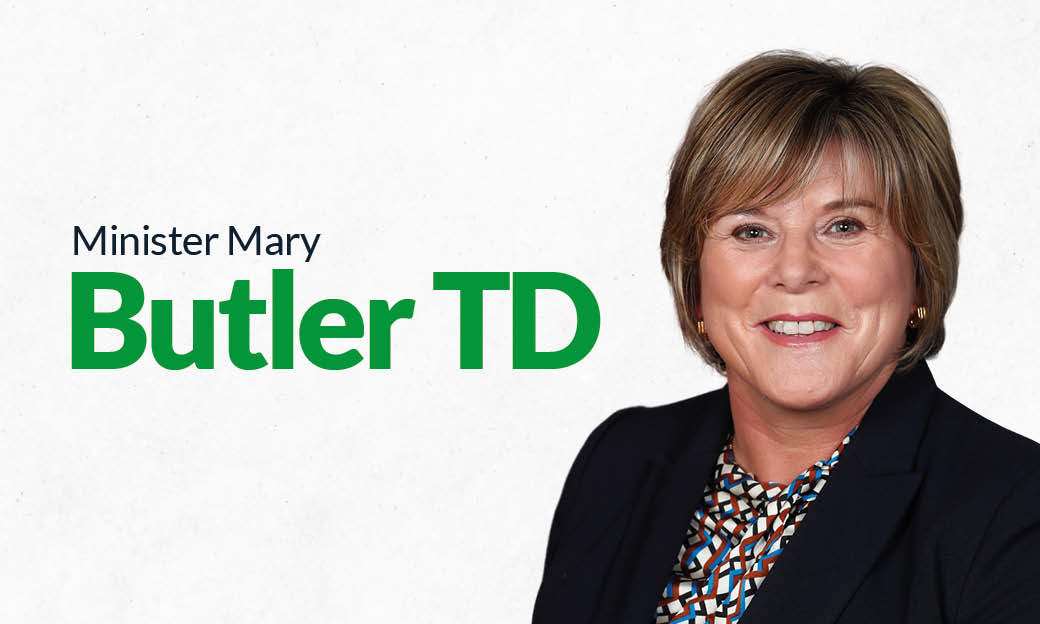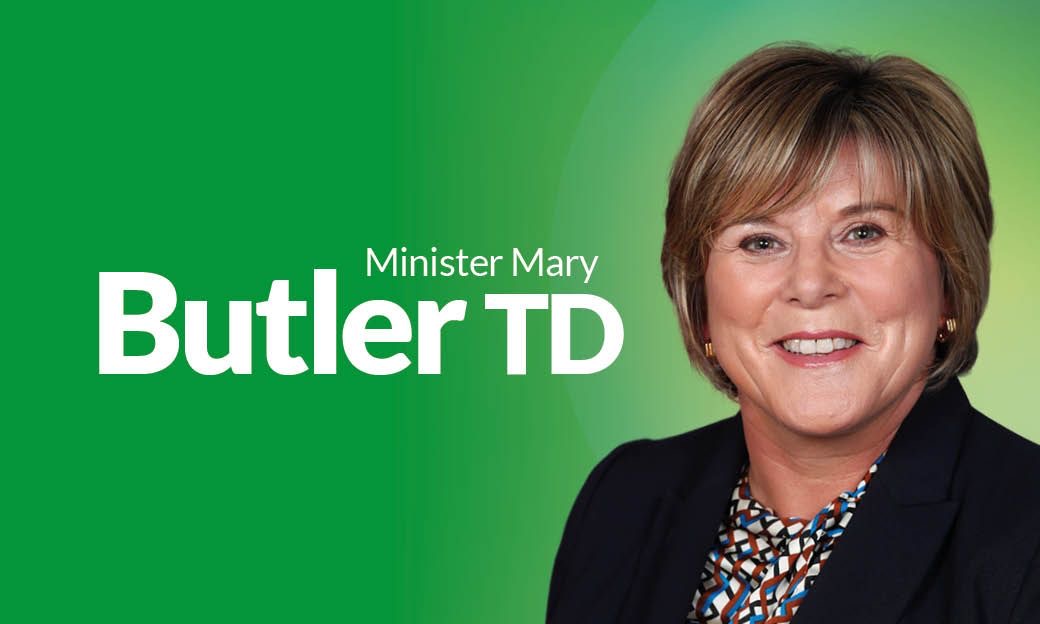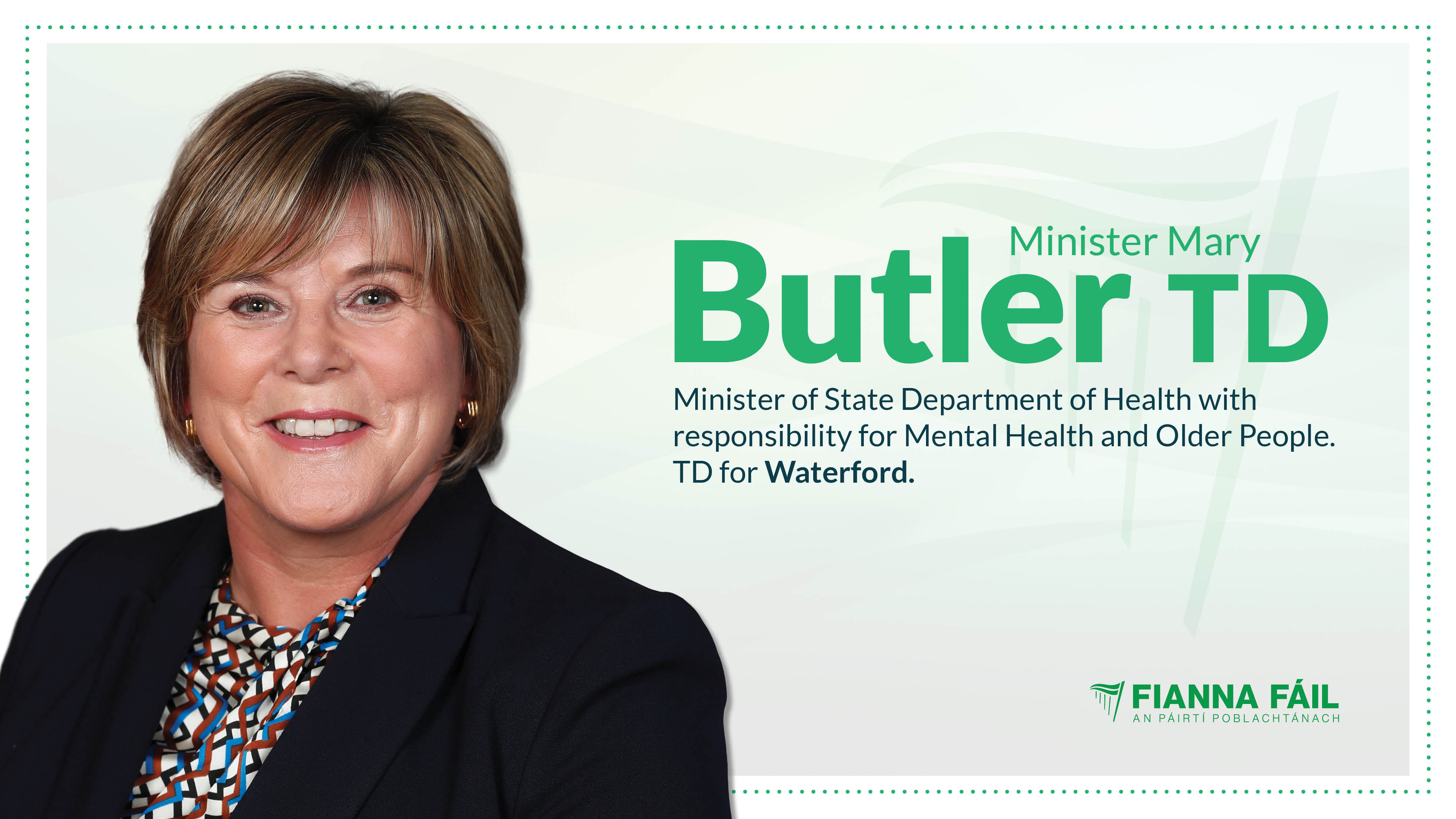Minister Butler welcomes updated Infection Prevention and Control Guidance for Nursing Homes
Published on: 18 February 2022
Minister for Mental Health and Older People, Mary Butler TD, has welcomed the publication by the HSE and the Health Protection Surveillance Centre (HPSC) of its latest review of the Infection Prevention and Control (IPC) Guidance for long-term residential care facilities. It comes into effect from 21 February 2022.
There are wide ranging changes reflecting the easing of public health measures more generally and taking account of the recent changes in visiting guidance.
Some of the main points in the guidance include:
- The inclusion of the nominated support person, as introduced in recent visiting guidance; this means the nominated support person has access to the resident, even if the resident has COVID-19, so long as they are made aware of and accept the associated risk;
- Social activities for residents should not be limited, except for residents who are infectious;
- Admissions of new residents to a nursing home should be suspended when an outbreak is declared but, in most cases, this suspension should only last for 7-10 days after the latest case is detected. This means that a nursing home may not need to wait for the outbreak to be declared over before it can reopen to new admissions;
- When residents get COVID-19 the periods of time they need to spend in isolation is reduced to 10 days for residents who have been vaccinated;
- The proper and regular use of hand hygiene, appropriate use of face masks, and other infection prevention measures outlined in the guideline remain very important for all resident care activities and for visiting activities.
Minister Butler stated that: “I am very pleased to be able to welcome this new guidance. It encourages nursing homes to resume social and recreational activities within the nursing home for residents, which will give people greater opportunity for social connectedness.
“Furthermore, there is need and desire for people to receive the right care, in the right place and at the right time, and I acknowledge the pragmatic approach adopted to facilitate recommencement of nursing home admissions in a timely and safe manner. This will ensure people requiring care can be supported in the most appropriate setting to their needs.
Minister Butler concluded that “As we welcome a greater sense of normality for residents and their families, there remains a need for all nursing home stakeholders to continue to be vigilant and apply the required infection prevention and control precautions.”
ENDS//
Notes for editors
COVID-19 is highly contagious and when it is circulating at high levels within the community, there is an increased risk that it will enter into nursing homes and other long-term residential care facilities. People in these settings are often very vulnerable to this virus and its effects, as well as the settings themselves posing risks in terms of infection control and prevention.
There is a continuing and clear need for ongoing vigilance and adherence to the IPC precautions in nursing homes and other long-term residential care facilities.
There has been significant progress in the rollout and uptake of vaccination and booster programmes in nursing homes; however, the prevalence of the more transmissible Omicron variant has posed a risk to nursing home residents and has impacted staffing availability across the sector.
The HSE’s Health Protection Surveillance Centre (HPSC) has developed this new guidance, available here: https://www.hpsc.ie/a-z/respiratory/coronavirus/novelcoronavirus/guidance/infectionpreventionandcontrolguidance/residentialcarefacilities/IPC%20and%20PH%20guidance%20for%20outbreaks.pdf
The guidance takes account of the removal of public health measures in the general public, whilst also recognising the need for continued vigilance and adherence to good infection prevention and control measures in healthcare settings such as nursing homes, due to the increased vulnerability of nursing home residents to the disease. The guidance gives significant direction to nursing homes on how to manage outbreaks of respiratory infections, in light of the changing public health measures and recommendations.
Some of the main points in the guidance are as follows:
- The inclusion of the nominated support person, as introduced in recent visiting guidance; this includes the nominated support person having access to the resident, even if the resident has COVID-19, so long as they are made aware of and accept the associated risk;
- Social activities for residents should not be limited, except for residents who are infectious;
- Social activities of newly admitted residents may be limited, but this should only be for seven days and during those seven days they do not need to stay in their room all of the time. If they want to go for a walk down the hall at a quiet time or go outside that is very little risk to anyone;
- Admissions of new residents to a nursing home should be suspended when an outbreak is declared but, in most cases, this suspension should only last for 7-10 days after the latest case is detected; this means that a nursing home may not need to wait for the outbreak to be declared over before it can reopen to new admissions;
- Residents who have been admitted to hospital from a nursing home may be discharged back to the nursing home they came from even if the nursing home is experiencing an outbreak, so long as measures are in place to protect the resident can from exposure to infection and the nursing home has capacity to manage the resident’s care needs;
- When residents get COVID-19 the periods of time they need to spend in isolation is reduced to 10 days for residents who have been vaccinated;
- The proper and regular use of hand hygiene, appropriate use of face masks, and other infection prevention measures outlined in the guideline remain very important for all resident care activities and for visiting activities.
The guidance encourages nursing homes to resume social and recreational activities within the nursing home for residents. Activities should no longer be suspended on infection prevention and control grounds, unless required for a short period during an outbreak.
The guidance reiterates the purpose a “nominated support person”, as introduced in recent visiting guidance, COVID-19: Normalising Access in Long Term Residential Care Facilities (LTRCFs), v1.4. The nominated support person should normally have unrestricted access to the resident for most of the day. If is considered necessary to limit access in the morning or evening when staff and residents are occupied with getting up or preparing for bed, when then at a minimum the nominated support person should have access from at least mid-morning to late afternoon. This is in addition to and not instead of visitor access as outlined below. The nominated support person should comply with the infection prevention and control measures that apply to a visitor when they attend the LTRCF. This will further support the mental health and wellbeing and social connection for residents.
Recognising the difficult landscape that COVID-19 has presented for long-term residential care settings, a series of enhanced measures have been agreed by the NPHET to provide support to these settings and these are currently being implemented by the HSE, HIQA and service providers. The substantial package of support measures for nursing homes includes measures to support those which have outbreaks of COVID-19 and measures aimed at breaking the chain of transmission of the virus. These supports have encompassed:
- Enhanced HSE engagement;
- Multidisciplinary clinical supports at CHO level through 23 COVID-19 Response Teams;
- Supply of precautionary and enhanced PPE, free of charge, including provision of FFP2 masks for patient care activities;
- Serial testing programme for all staff of nursing homes (implementation of serial testing is now evolving with changing epidemiological situations, risk profile, vaccination coverage and in line with public health advice);
- Where possible, access to staff from community and acute hospitals;
- Suite of focused public health guidance and training resources;
- Temporary financial support scheme for private and voluntary nursing homes with over €122m in additional funding payments made to January 2022; the outbreak assistance is in place to March 2022;
- Temporary accommodation to nursing home staff to support measures to block the chain of transmission



